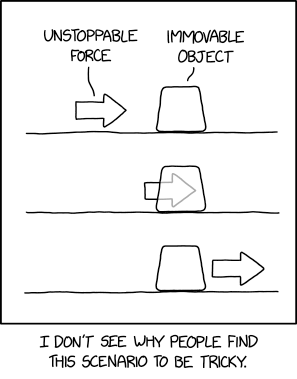this post was submitted on 02 May 2025
847 points (98.4% liked)
xkcd
11627 readers
152 users here now
A community for a webcomic of romance, sarcasm, math, and language.
founded 2 years ago
MODERATORS
you are viewing a single comment's thread
view the rest of the comments
view the rest of the comments

I think if God creates a rock so heavy he can't lift it, it's probably a black hole. By definition we can't know what happens inside a black hole, because no information escapes the event horizon. As it's now consistent with known physics that we can't know many aspects of this interaction between God and the black hole, I think this paradox is basically solved. We don't know any more about the interaction, but it's no longer a paradox, it's consistent with physics.
But black holes have finite mass. By "heavy" you're implying it's infinitely heavy or something.
You can definitely also lift a black hole.
Well I don't know about any objects more massive than black holes. I think a black hole is really the only viable form a body can take once there's enough matter in one place, like there's an upper limit for the size of stars and after that anything larger collapses into a black hole.
An object of infinite mass is a contradiction, a universe can't exist with a single object of infinite mass, it would consume everything instantly.
It may be worth it to decide how we define ‘unstoppable force’ and ‘immovable object’.
An Immovable Object has 0 velocity:
v = 0
Acceleration is the time derivative of velocity:
a = d/dt(v(t))
a = d/dt(0)
a = 0
And we know that
a = F~net~ / m
An object with infinite mass would satisfy this equation, but an object with no net force would too. We could add a correction force that will satisfy the constraint of 0 net force.
|F~net~| = 0
∑F~i~ = 0
F~correction~ + … = 0
To satisfy Newton’s 3rd law, we would need a reaction force to our correction force somewhere, but let’s not worry about that for now.
A physics definition of ‘Unstoppable Force’ is:
|F~unstoppable~| =/= 0
In this case the gravitational force fits this description, given a few constraints
F~g~ = Gm∑ M~i~ / x~i~^2^
As long as the gravitational constant G is not 0, our object has mass, and
∑ M~i~ / x~i~^2^ =/= 0, then
|F~g~| > 0
But this does feel kinda like cheating because it’s not really what people mean by ‘unstoppable force’. the other way to define it is just immovable object in a different reference frame.
a = 0, |v| > 0
I’m gonna stop here because this is annoying to type out on mobile